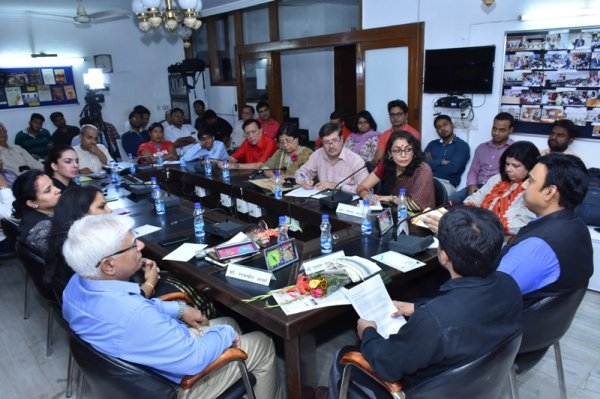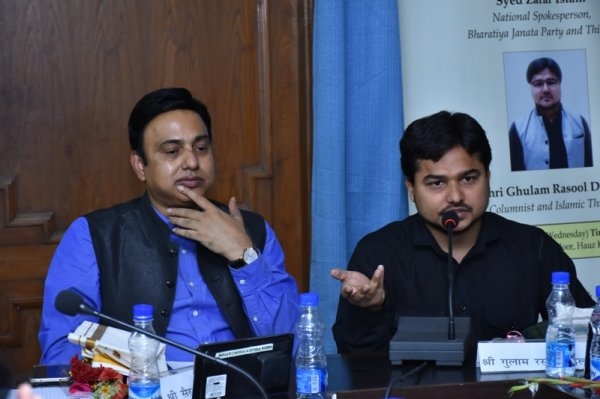Islam in the Context of Indianisation
Total Views |
May 24, 2017, IPF Seminar Hall, New Delhi
Chair: Dr. Rajvir Sharma, University of Delhi
Speakers: Sh. Syed Zafar Islam, National Spokesperson, BJP
Sh. Ghulam Rasool Dehlvi, Columnist and Islamic Thinker
The event was graced with the presence of chief guests, Mr. Syed Zafar Islam, National Spokesperson for the BJP and Mr. GhulamRasoolDehlvi, a renowned columnist and Islamic thinker. It was chaired over by Dr.Geeta Bhatt who began by providing a short contextual understanding of Islam in India, tracing back its origin to 700 BC.

Mr. Syed Zafar Islam, in his usual candour, began by stating that he felt apprehensive speaking on an issue that did not fall within his expertise of economics. He confirmed that such an issue is immensely relevant today, in the light of the surging communal tensions. He pointed out that the issue was both of a cultural identity as well as nationalism. Mr. Zafar Islam spoke about how the Islamic community in India was attached to the concept of ‘sanskriti’ rather than ‘dharma’. He stated as to how the growth of Islam in India was not concomitant to that of states such as those of the Middle East. This, according to Mr. Zafar Islam, was the reason a dichotomy existed between Arab Muslims and Indian Muslims, the latter being referred to as ‘Al-Hind’, by the former. Islam also accommodated and adopted the Indian culture or ‘sanskriti’ to an increasingly greater amount with the passage of time. Mr. Zafar Islam also cited numerous examples of traditional practices endemic to India that were practiced solely by the Islamic community in India. Such include the likes of ‘chaddarchadhana’, a practice of covering holy scriptures in dargahs with blankets, the manner in which ceremonial processions and rituals are carried out as well as the use of ‘holy water’ therein, all traditional practices which have grown and concretized within the Indian subcontinent owing to its association and shared cultural identity. ‘It is quite common to see Muslim women celebrating ChhatPooja, and Muslims burning crackers on festivals like Diwali,’ he noted. Indian Islam, he pointed out is quite flexible and all Indians have a tendency to live together in harmony. He concluded by saying that, India has been a tolerant nation and Indian Islam has to become an inspiration for the world. The voice of harmony has to also come from the youth participation.

Mr. Zafar Islam attributed the growth and perpetuation of Islam in India to the Indian traditional and cultural values.He informed the audience that Islam, to spread to the Indian subcontinent, had to Indianise itself. He credited our ‘purvaj’ or ancestors for their proper understanding and promulgation of the Islamic tenets. Such only goes to show that the contempt and dissatisfaction felt against the Islamic community was founded on an improper understanding of the cultural and societal similarities shared by both the predominant communities in India.
To conclude with, Mr. Zafar Islam stated that a ‘mishran’ or blend of Bhakti movement and Sufism will fill the country’s gap towards progress and that the youth of today bears the burden of being brought to the forefront of policy making and conflict resolution.
Mr. Ghulam Rasool Dehlvi was the next speaker. His address was as erudite as it was insightful. Beginning with a quote from Swami Vivekanada, Mr.Dehlvi’s speech was adorned with excerpts from sacred Islamic texts as well as renowned Sufi and other religious thinkers throughout, lending credence to his primary statement of ‘synergy between Vedanta’s brain and Islam’s body’. He stated as to how Islam in India is and always has been in sync with Vedanta spirit of religious faiths. A parallel was drawn between the Shrutis and Smritis, the sacred Hindu texts and their similarity to Wahi and Hadis, the Islamic religious writings. Mr. Dehlvi also spoke about in great detail about concepts such as ‘Wahadat-e-deen’, or Unity of Religion and ‘Wahadat-al-Wajood’ or Unity of Being. Such have been propagated by stalwarts like Maulana Abul Kalam Azad in his famous treatise ‘Tarjuman-al-Qu’ran’. Mr. Dehlvi spoke about how such beliefs were essential to a proper understanding of the Islamic religion and how there were a multiplicity of commonalities, such as the phrase ‘Vasudhaiva Kutumbakam’ meaning ‘the world is one family’, finding its place, in various forms, in both the Maha Upanishad as well as the Hadis. However, such similarities and a propagation of the Rishi-Sufi tradition, which spoke greatly about inclusivity, is absent from the contemporary narrative and subsequent discourse leading to communal tension and violence, according to Mr. Dehlvi.
Mr. Dehlvi’s address to the audience was replete with commonalities and shared cultural practices between the Islamic and Hindu communities. Such were exemplified by drawing similarity between the practice of Yoga and Namaz, as stated by KhwajaMoinuddinChishti of the Ajmer Dargah. Mr.Dehlvi, through a deep understanding of Islamic history and its essential tenets also dispelled various unfounded notions of the Muslim community being against practice of cow slaughter ban and cited how the Ajmer Dargah had prevented non-vegetarian food from being served there for centuries. Such only goes to show as to how in contemporary India, Islam has been morphed into a political identity, solely to be appropriated by politicians in an aim to appease a community.
Mr. Dehlvi, thus, drew an important distinction between oft cited, misunderstood Islam and the real beliefs that any true Muslim individual would hold dear to his heart. Islam is believed to be a natural religion, in the same way Bhagwad Gita speaks of Hinduism bring taught by nature. Indian religious values, he noted, have to be an amalgamation of Vedanta’s brain and Islam’s body. He observed that Shrutis and Smritis in Hinduism are quite similar to Wahi and Hadis in Islam. Moreover, both religions believe in the idea of one creator. That mankind is like a family of God is the central idea of both the religions. He lamented that today, Islam is not being preached by Sufis and saints, rather hardcore fundamentalists, who misguide masses by their misconstruction of the Holy Quran.
The chief guests, thus, concluded their speeches, after which Prof. Rakesh Sinha delivered a brief oration filled with statistical data and analysis of population trends, which supported his statement of the Muslim community being as much a part of the ancestral history and heritage of India, as any other community.
Thereafter, the floor was opened for a Question-Answer session. A sum understanding of the entire talk was delivered by Dr.Rajveer Sharma in his ‘votes of thanks.